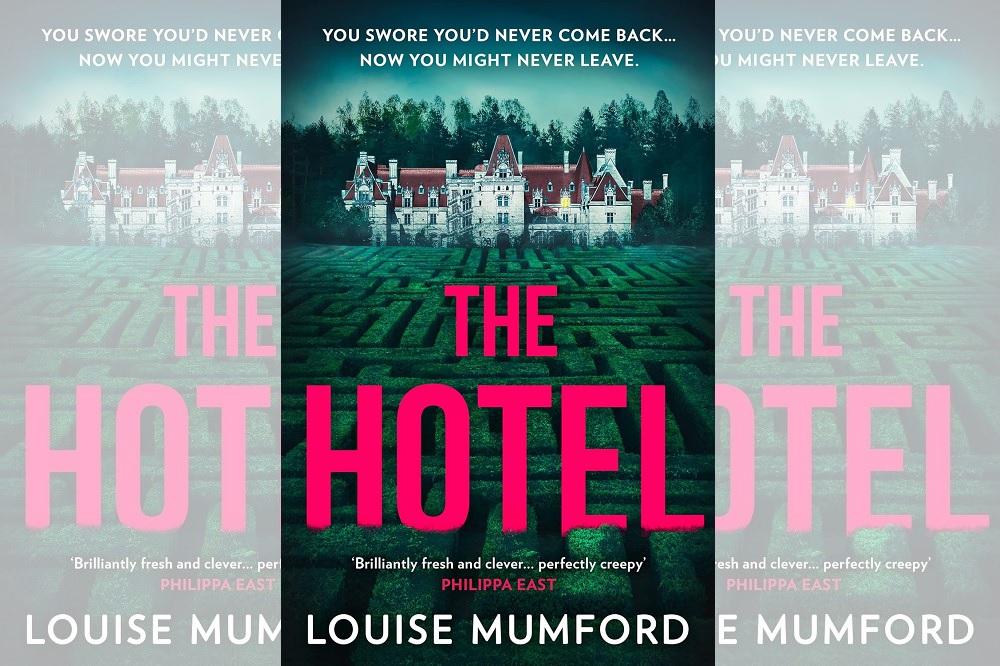Review: The Hotel by Louise Mumford

Myfanwy Alexander
The Hotel is a very clever book indeed. Like all thrillers, it is intricately plotted but this book transcends the mechanical smartness inherent in the telling of a complex tale and becomes an exuberant celebration of the genre of horror, a knife-sharp satire on the cult of celebrity and it throws a bomb into the whole concept of the reliability of narrators.
Mumford gathers her army of recognizable types and marches them through familiar settings but with a verve and irony which will leave the reader breathless.
It’s a fabulous cocktail of Stephen King and Charlotte Bronte, of Donna Tartt and the Hammer House of Horror: Mumford’s extraordinary gift is to juxtapose these elements in a narrative which, at times feels like an avalanche.
Like the rotting floors in Ravencliffe, the abandoned hotel high on some Welsh cliffs where most of the novel it set, the ground suddenly gives way beneath one’s feet as a glorious grand guignol set piece turns out to have either a very quotidian explanation or be only the prelude to yet more gloom and gore.
And all the time, the action is being filmed to make a TV programme to service the cult generated by the film created in Blair Witch style by the four young people ten years before.
Haunted
The action begins when the protagonist Bex, dresses as herself ten years ago to attend a cos play convention for fans of the film she created with her three friends when, in post A-level doldrums, they decided to go, in the style of Scooby Doo, to a reputedly haunted building at night.
During this expedition, one of the party, Leo, disappears and the mystery of what happened to him has haunted Bex ever since.
It is announced that there will be a reunion, held at Ravencliffe, organized by a TV company. Bex is at first reluctant to attend but is goaded into going by the arrival of a mysterious note containing a clue.
It is indeed time to find out what happened to Leo.
Names
A word here about names. I do not believe for one moment that it is an accident that Mumford’s protagonist has a name ‘Bex Harrison’ which is only one stroke of the pen away from that of a Hollywood star and though he was not famous for his appearance in horror movies, unless one counts proto-thriller The Long Dark Hall, his most renowned role, as Professor Higgins in My Fair Lady is a study of a man’s failure to retain grasp of his own narrative.
I could be overthinking this but Bex returns to Ravencliffe to impose her own order on the chaos of memory, her own and those of her friends. Mumford choose to locate the bored adolescents in Caerffili, though there are no Sions or Gwens to be found amongst the characters.
Instead we have the overly-theatrical Oscar, concealing his secrets beneath a showy but brittle confidence and Richard who behaves throughout like a vulgar abbreviation of his name. The vigorously masculine carpenter is ‘Manning’ and the failed hotelier, bogged down in a tangle of detail, is ‘Morwood.’
This is not a puzzle in any sense but rather Mumford throws us little morsels to enjoy as if she were the generous owner of a pack of greedy but enthusiastic dogs. And don’t get me started on the character, known by a name which is emblematic of sharp defensiveness who is later called a name meaning wisdom.
Obsessions
Worlds nest within worlds in this book. Bex’s flat which she seldom leaves, is both refuge and prison.
The Ravencliffe Convention is a goldfish bowl of fantasists and hyperbolic theory where a generation reared on Harry Potter and Stranger Things try to know everything about characters at once both real and fictional whilst failing to recognize that the most reclusive of the famed trio is sitting right beside them.
Fandom and its neuroses are neatly skewered as are the products generated by these obsessions: the Ravencliffe merch is a recurring theme.
The teenagers, whose behaviour throughout almost seems to be good reason to raise, not lower the voting age, set out for a creepy deserted hotel and so, of course, Leo has a copy of The Shining in his pocket.
The TV company attempt to turn Ravencliffe into an orderly set for their filming, but the horror keeps seeping back through their plans.
Spoofing
It’s a good read but it’s also the Northanger Abbey for our times. Austen knew and loved the genre she was spoofing and Mumford clearly feels the same about modern tales of horror.
If you read or watch modern gore-fests, such as those showcased in the recent Abertoir Festival, whilst at the same time being conscious of the absurdity of some of the familiar tropes, if you relish a sizzling satire, if you just want to find out what happened to Leo, or to open the creaking door to Ravencliffe to be assured that the bad guys would have got away with it if it hadn’t ‘ve been for those pesky kids, The Hotel awaits.
The Hotel by Louise Mumford is published by Harper Collins and is available from all good bookshops.
Support our Nation today
For the price of a cup of coffee a month you can help us create an independent, not-for-profit, national news service for the people of Wales, by the people of Wales.





